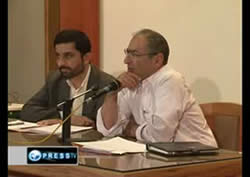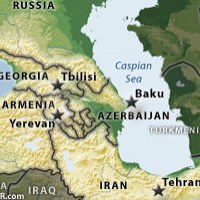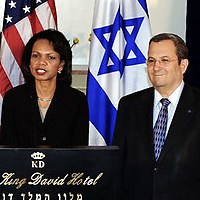Debate in Tehran’s Amirkabir University offers a glimpse into intellectuals’ views on policy towards Israel, Palestinians, and Lebanon.
Published: may 16, 2010; Intelligence and Terrorism Information Center.
Edited by Raz Zimmt,

Reformist opposition as depicted on an ultra-conservative blog. The major enemies: there is nothing but Zionism behind the scenes of the “incitement faction.” And Mousavi: a product of the US and of Zionism from the Iranian blog duel.blogfa.com.
A debate between two leading Iranian intellections was held in Amirkabir University this week. The debate between Professor Sadegh Zibakalam and Professor Mohammad-Reza Marandi offered a fascinating glimpse into concerns brought up since the 90s on the periphery of Iranian intellectual debate on the country’s policy towards Israel and the Israeli-Palestinian conflict, as well as into the tension between revolutionary ideological views and national political interests in Iran’s foreign policy.
Professor Sadegh Zibakalam is one of the leading reformist intellectuals and political commentators, and a lecturer on political science in Tehran University. In recent years, Zibakalam has repeatedly voiced strong criticism against the policy of the regime, including the foreign and nuclear policy of the Iranian leadership. Professor Mohammad-Reza Marandi is a researcher from Tehran’s Shahid Beheshti University and a leading political commentator affiliated with conservative circles in Iran. The debate held between them this past Monday (May 10) dealt with Iran’s support of the Palestinians and of Lebanon, and was widely covered by Iranian media.
During the debate, Zibakalam brought up a fundamental issue: should Iran support Palestinian and Lebanese radical groups just because they are Muslim and/or Shi’ite, or should it formulate its policy towards them based only on national interests? He questioned Iran’s stated commitment to the struggle of Muslims worldwide, claiming that, in fact, Iran does not assist Muslims struggling in China or in Chechnya due to its commitment to national interests involving its relations with those countries. The implication is that Iran acts according to its national interests, and that it must therefore consider its policy of supporting the Palestinians and Lebanon on the basis of those interests. If there ever comes a day when that policy does not coincide with Iran’s national interests, it will have to reassess its policy.
Zibakalam expressed his opinion that Iran’s considerable investment in Lebanon and Palestine does not serve Iran’s interests. Many believe, he pointed out, that this investment is designed to support Iran’s offensive strategy in its struggle against Israel, and to let it take the initiative. According to Zibakalam, he accepts the principle saying that if Israel is a strategic enemy, efforts must be made to move the confrontation with it to its borders by supporting Palestinian and Lebanese radical groups. He wondered, however, whether Iran’s view of Israel as a strategic enemy and its desire to eliminate it were justified. In that, he said, Iran’s stance is “more Palestinian than the Palestinians”. If the Palestinians themselves recognize Israel and its legitimacy, Iran cannot take a contradicting view and call for the destruction of Israel. The slogan calling for the destruction of the State of Israel—while the major discussion on the Israeli-Palestinian conflict focuses on the need to establish two independent countries—is wrong and detrimental to Iran’s national interests.
The leading reformist intellectual added that the ongoing analysis in Iran of the roots of the establishment of the State of Israel is fundamentally flawed, since it is based on the assumption that the establishment of Israel only has to do with the interests of Western countries, ignoring the fact that Israel is the product of a centuries-old historical struggle of the Jewish people. Zibakalam shortly went over the history of the Jewish people and the Zionist movement, arguing that the establishment of Israel cannot be understood without understanding the history of the Jews in Europe in the past two thousand years, particularly since the 19th century. In that context, Zibakalam referred to the murder of six million Jews in the Holocaust as a historical fact.
Mohammad-Reza Marandi agreed with Zibakalam’s assertion that the foreign policy of any country, including Iran, must be based on interests. He noted, however, that a country’s interests cannot be confined only to the material—rather, they must also serve spiritual and ideological functions, and must be both short-term and long-term. He said that while there are sometimes contradictions in Iran’s foreign policy when it comes to supporting the struggle of Muslims in various places worldwide, those contradictions exist only on the tactical level, not on the strategic level.
Iran is not the only country in the world that protects its national interests also outside of its borders, and many countries invest considerable resources in other countries to realize their interests, said Marandi. Iran’s investment in Lebanon and Palestine stems from its desire to preserve its influence and power in the region, and its policy towards Palestine and Lebanon cannot be compared to its policy in China and Chechnya, since it stems from different interests. Furthermore, Israel is an illegitimate country that cannot be compared, for example, to China.
Regarding the existence of the State of Israel, Marandi said that the dissolution of the USSR in 1991 may offer clues about the future of Israel. He noted that even in Israel there are people who believe that it will cease to exist in about a decade. According to Marandi, the establishment of Israel has to do with material interests of Western countries, which sought to secure their influence in the region by establishing Israel.
Speaking about the Holocaust, Marandi reiterated the familiar stance of Iranian authorities, strongly criticized the attitude towards Holocaust denial in European countries, and noted that Western countries’ views on the Holocaust reflect the depth of Zionist influence in those countries (Fars, May 11).



 RSS
RSS











Iran’s Intellectuals’ Views On Policy Towards Israel, Palestinians and Lebanon #iran #israel #jcot #islam http://j.mp/caLueo
RT @CrethiPlethi: Iran’s Intellectuals’ Views On Policy Towards Israel, Palestinians and Lebanon #iran #israel #jcot #islam http://j.mp/caLueo
[…] This post was mentioned on Twitter by Elisabeth, Crethi Plethi. Crethi Plethi said: Iran’s Intellectuals’ Views On Policy Towards Israel, Palestinians and Lebanon #iran #israel #jcot #islam http://j.mp/caLueo […]
RT @CrethiPlethi: Iran’s Intellectuals’ Views On Policy Towards Israel, Palestinians and Lebanon #iran #israel #jcot #islam http://j.mp/caLueo
RT @CrethiPlethi Iran’s Intellectuals’ Views On Policy Towards Israel, Palestinians and Lebanon #iranelection http://j.mp/caLueo
down with usa
down with israel